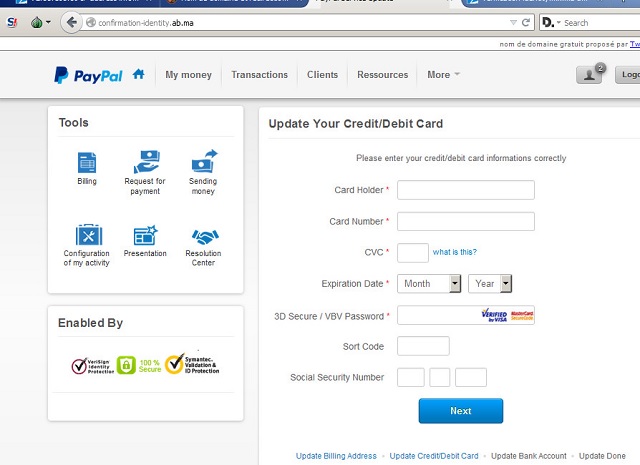New scam targets PayPal users
Posted by: Timothy Weaver on 05/09/2015 09:27 AM
[
 Comments
]
Comments
]
Users of PayPal are being targeted in a new email scam.
The Email reads as follows:
Your Account PayPal Has Been Limited !
Dear Customer,
To get back into your PayPal account, you'll need to confirm your identity.
It's easy:
Click on the link below or copy and past the link into your browser.
Confirm that you're the owner of the account, and then follow the instructions.
If you check the email, you will find that it originates from Morocco:
confirm-identity(dot)me(dot)ma
Other originating sites include:
confirmation-identity(dot)ab(dot)ma/
confirm-identity(dot)about(dot)ma/
verification-identity(dot)me(dot)ma/
resolution-center(dot)me(dot)ma/
confirm-identity(dot)about(dot)ma/
confirm-identity(dot)ab(dot)ma/
verification-identity(dot)mx(dot)ma/

In all cases, delete the mail and don’t click on the URLs which aren’t official PayPal domains or secured with https (occasionally phish pages use https, but they’re pretty rare).
Source: MalwareBytes
The Email reads as follows:
Your Account PayPal Has Been Limited !
Dear Customer,
To get back into your PayPal account, you'll need to confirm your identity.
It's easy:
Click on the link below or copy and past the link into your browser.
Confirm that you're the owner of the account, and then follow the instructions.
If you check the email, you will find that it originates from Morocco:
confirm-identity(dot)me(dot)ma
Other originating sites include:
confirmation-identity(dot)ab(dot)ma/
confirm-identity(dot)about(dot)ma/
verification-identity(dot)me(dot)ma/
resolution-center(dot)me(dot)ma/
confirm-identity(dot)about(dot)ma/
confirm-identity(dot)ab(dot)ma/
verification-identity(dot)mx(dot)ma/

In all cases, delete the mail and don’t click on the URLs which aren’t official PayPal domains or secured with https (occasionally phish pages use https, but they’re pretty rare).
Source: MalwareBytes
Comments






